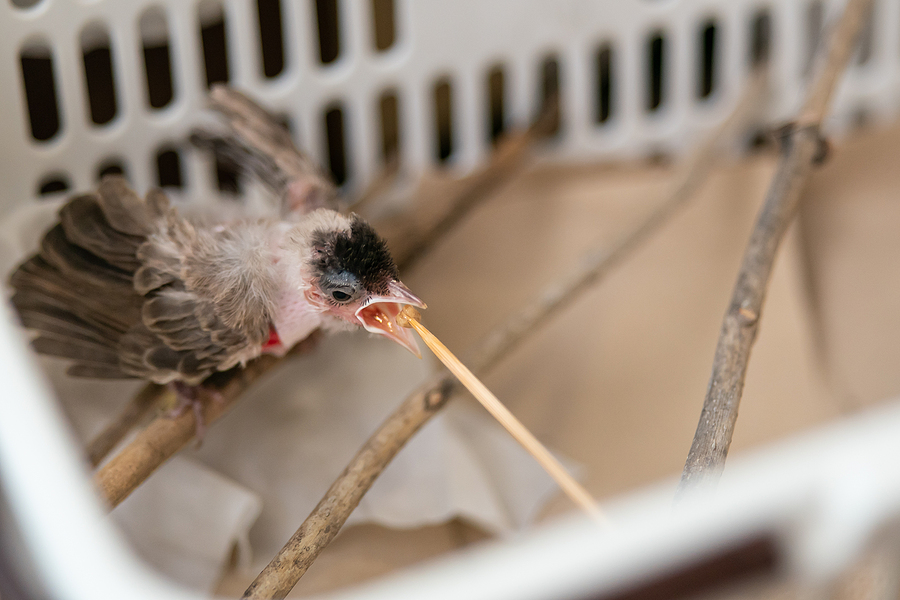Whether you just discovered a nest of baby birds, an orphaned baby squirrel, or a turtle out by the pond, it is important that you understand local, state, and federal laws that govern taking in wild animals as pets. Wild animals are feral, and therefore capable of aggressive, unpredictable, and/or harmful behaviors. Even a baby animal, as cute as they look, will inevitably mature into the full-grown species it is. From wildlife laws and regulations to damage, disease, injury, cruelty, and more, keeping a wild animal as a pet is an urge you and your children should strongly reconsider.
Continue reading to learn what you need to know about keeping a wild animal as a pet in Indiana, plus what you can do if you are experiencing nuisance wildlife problems in or around your property.

Animals are Closer Than Ever
Today, wildlife is closer to us than they have even been before. Due to land over-development, loss of natural habitats, and similar factors, animals like raccoons, opossum, skunks, snakes, squirrels, rabbits, and more are being pushed out of their natural environments, forcing them to look for food and shelter in urban and suburban territories. It is common to stumble across an orphaned or injured animal, like a bird or bunny, while it is also common to find animals on your property just lingering about, such as snakes, toads, and salamanders.
Although in our childhood it was common to find these little critters and keep them as pets for as long as we could keep them alive. But today, this is considered inhumane; in some cases, it is even against the law. Furthermore, wild animals are known carriers of several infectious and transmissible diseases that can infect both people and pets. Common illnesses, rabies virus, leptospirosis, Salmonella, E. coli, roundworm, distemper, Parvo, and a long list of ectoparasites (lice, mites, ticks, fleas, etc.).
Orphaned or Abandoned Animals
If you find an orphaned or seemingly abandoned animal, it is important that you leave the animal alone. If the animal is located in an area of your property that sees a lot of foot traffic or that requires lawn care, you can relocate the animal close to its nest or at the edge of your property. In Indiana, it is against the law to transport a wild animal to another property. You could face fines and similar civil penalties. When in doubt, contact a licensed wildlife control company in Indianapolis for professional animal removal service.
If you choose to move the animal to the edge of your property, be sure to wear thick utility gloves and use a shoebox and small broom or brush to gently transfer the animal into the shoebox so that you may relocate them farther away. If the animal is injured, the rule of thumb is to let nature take its course, as hard as that might pull on the old heartstrings. You may also choose to contact a wildlife rehabilitator in your area.
Injured and Baby Birds
It is very common to come across a nest of baby birds or even a single baby bird laying on the ground. Although the baby bird seems totally helpless, it is very possible that the mother is nearby and will return soon to put the baby back in the nest. If you are sure that the baby bird is orphaned or injured, and you wish to keep it or return it to health, it must be a specific species of birds. Almost all birds are state and federally protected.
The only bird species that are not protected under law are European starlings, feral pigeons, and English sparrows. If you can accurately identify the species of bird that you have found, and it is a non-protected species, you can choose to keep it, but beware, you will likely need a permit. Further beware that, birds, even baby ones, carry several diseases and ectoparasites like lice and mites. You never want to touch one with your bare hands.
Injured or Sick Bat
If you find a sick or injured bat on your property, it is important that you keep your distance. Never attempt to touch, trap, harm, or kill a bat. Some bats are federally protected by the Endangered Species Act, while others are known carriers of serious infectious diseases like the Rabies virus. Instead, contact a local Indianapolis bat removal company for professional assistance. You may also report the dead, or sick bat to the Department of natural resources by filling out a “Report Sick or Dead Wildlife” form.
Turtles
It is common for children to find a turtle and want to keep it as a pet. And this is perfectly fine, so long as you have the proper permit, or a hunting or fishing license registered in Indiana. Also, certain turtle species are protected and cannot be kept as a pet, let alone tampered with, including Eastern box turtles and Alligator Snapping turtles. However, before you agree to a wild pet turtle, understand that turtles are common carriers of salmonella bacteria.
Are you experiencing nuisance critter problems around your Indiana home or business? Contact Modern Wildlife Control at 317-847-6409 for safe and effective animal trapping and removal services in Indianapolis, Indiana.
Related Posts:
Can You Hunt Pigeons Without a License?
How to Safely Get Rid of a Dead Animal on Your Property
Modern Wildlife Control Has Your Solution to Nuisance Animal Problems This Fall
